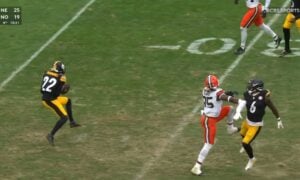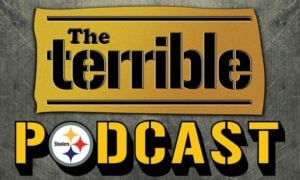The NFL has had some interesting playing surfaces over the years, like the converted baseball diamonds that NFL teams used to play on. But as the league has grown in profile and approaches the quarter trillion dollar mark in net worth, it’s completely unacceptable to play with subpar conditions. Yet that’s what the Pittsburgh Steelers and Cleveland Browns experienced in Week 6 at Acrisure Stadium.
Browns OL Joel Bitonio still can’t get over how bad it was.
“That’s the worst field I’ve played on,” Bitonio said via Daniel Oyefusi on X.
I would imagine Bitonio is including college and maybe even high school surfaces if it’s the worst he has ever played on. I don’t know about you, but I played on some dilapidated fields in youth football growing up.
“It was bad. I mean, anytime you stepped, so much turfs coming…it was pretty much like dirt but piled up,” Bitonio said in a video posted by Scott Petrak on X. “It was kind of embarrassing that the National Football League, the best in the world, is playing on that grass for a game. I know they have a lot of teams that play there, but I just feel like that’s not a great excuse.”
Aaron Rodgers called it “borderline unplayable” in the immediate aftermath of the game, and several players reportedly reached out to the NFLPA with complaints about the field conditions. It’s not like there was a downpour or anything abnormal to cause it, they just hadn’t properly maintained the grass that gets shared with the University of Pittsburgh.
The Steelers aren’t the only team to share a stadium with other teams. As the debate against artificial surfaces rages on, the Steelers’ Week 6 surface is one argument in favor of the dangerous alternative. They are lucky that only one player suffered a major injury in that game, but even one is too many if it had anything to do with the field.
The stadium was already scheduled to be resodded after that game. But as Bitonio said, “the game is already over. The game that we played on it. So it was a little bit frustrating for sure.”
Hopefully all the bad PR spurs some change in how they handle the multiple teams sharing the field, or the frequency in which they resod.








